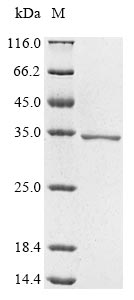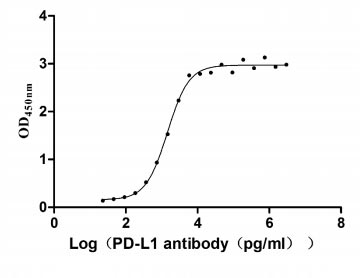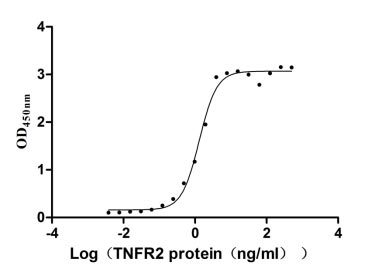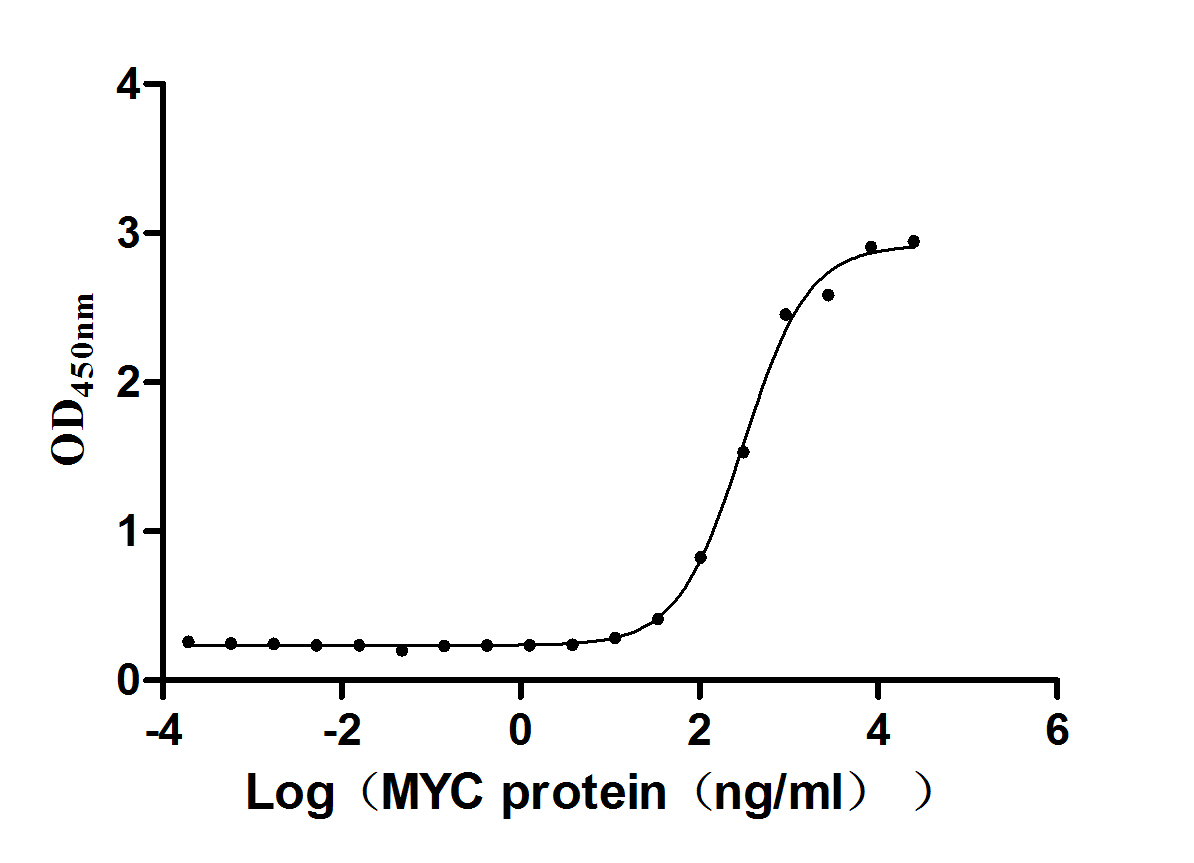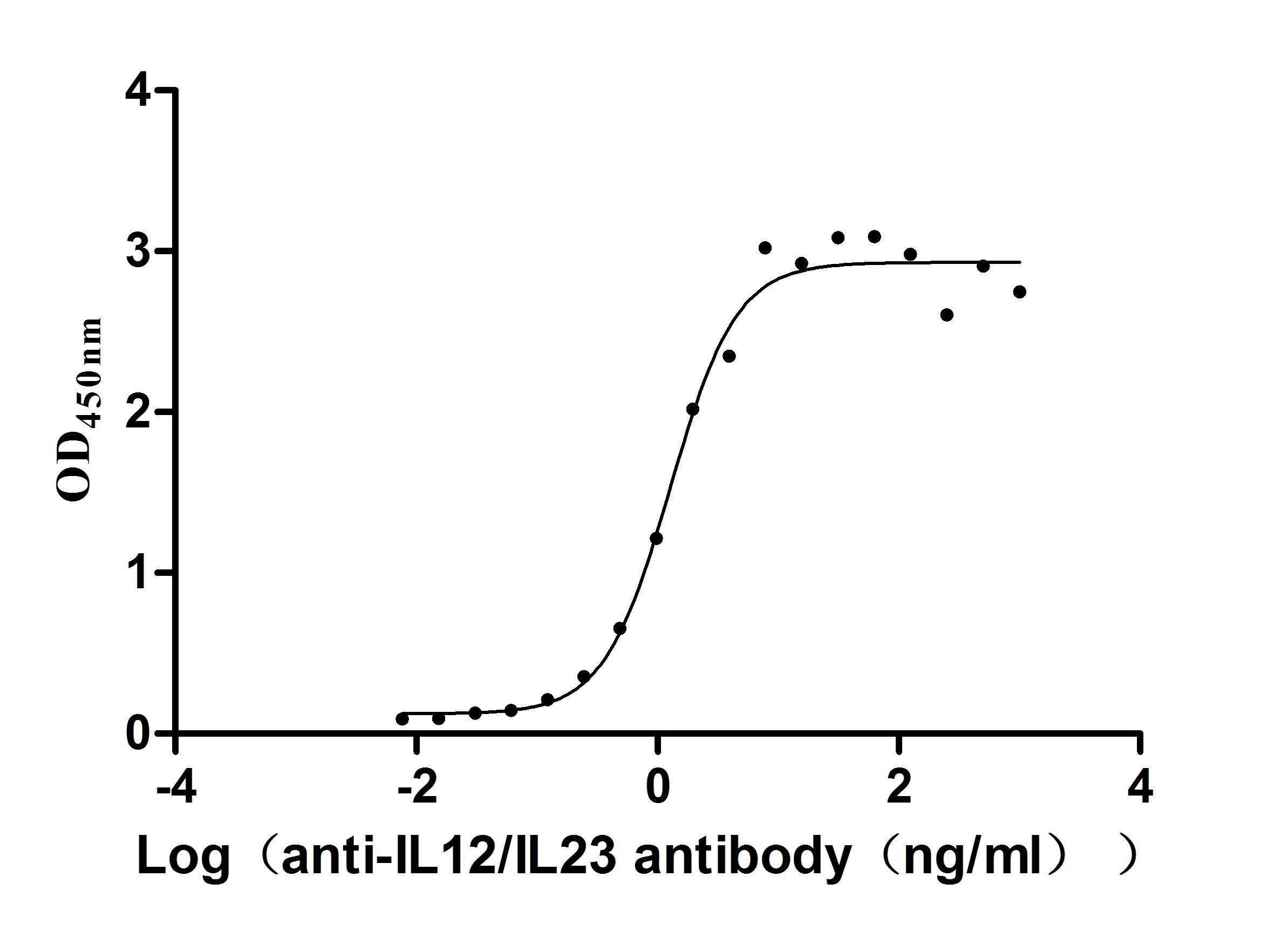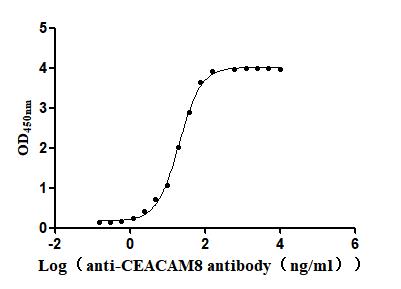Recombinant Human B-cell CLL/lymphoma 9 protein (BCL9), partial
-
货号:CSB-EP002631HU
-
规格:¥1836
-
图片:
-
其他:
产品详情
-
纯度:Greater than 85% as determined by SDS-PAGE.
-
基因名:
-
Uniprot No.:
-
别名:Protein legless homolog
-
种属:Homo sapiens (Human)
-
蛋白长度:partial
-
来源:E.coli
-
分子量:26.7 kDa
-
表达区域:174-396aa
-
氨基酸序列AKVVYVFSTEMANKAAEAVLKGQVETIVSFHIQNISNNKTERSTAPLNTQISALRNDPKPLPQQPPAPANQDQNSSQNTRLQPTPPIPAPAPKPAAPPRPLDRESPGVENKLIPSVGSPASSTPLPPDGTGPNSTPNNRAVTPVSQGSNSSSADPKAPPPPPVSSGEPPTLGENPDGLSQEQLEHRERSLQTLRDIQRMLFPDEKEFTGAQSGGPQQNPGVLD
Note: The complete sequence including tag sequence, target protein sequence and linker sequence could be provided upon request. -
蛋白标签:N-terminal 6xHis-tagged and C-terminal 6xHis-tagged
-
产品提供形式:Liquid or Lyophilized powder
Note: We will preferentially ship the format that we have in stock, however, if you have any special requirement for the format, please remark your requirement when placing the order, we will prepare according to your demand. -
缓冲液:If the delivery form is liquid, the default storage buffer is Tris/PBS-based buffer, 5%-50% glycerol. If the delivery form is lyophilized powder, the buffer before lyophilization is Tris/PBS-based buffer, 6% Trehalose.
-
复溶:We recommend that this vial be briefly centrifuged prior to opening to bring the contents to the bottom. Please reconstitute protein in deionized sterile water to a concentration of 0.1-1.0 mg/mL.We recommend to add 5-50% of glycerol (final concentration) and aliquot for long-term storage at -20°C/-80°C. Our default final concentration of glycerol is 50%. Customers could use it as reference.
-
储存条件:Store at -20°C/-80°C upon receipt, aliquoting is necessary for mutiple use. Avoid repeated freeze-thaw cycles.
-
保质期:The shelf life is related to many factors, storage state, buffer ingredients, storage temperature and the stability of the protein itself.
Generally, the shelf life of liquid form is 6 months at -20°C/-80°C. The shelf life of lyophilized form is 12 months at -20°C/-80°C. -
货期:13-23 business days
-
注意事项:Repeated freezing and thawing is not recommended. Store working aliquots at 4°C for up to one week.
-
Datasheet & COA:Please contact us to get it.
相关产品
靶点详情
-
功能:Involved in signal transduction through the Wnt pathway. Promotes beta-catenin's transcriptional activity.
-
基因功能参考文献:
- Specific regulation of BCL9 expression by HIF-1alpha may prove to be an underlying crosstalk between Wnt/beta-catenin signaling and hypoxia signaling pathways. PMID: 28074862
- Results find that BCL9 is upregulated in osteosarcoma (OS) tissues and promotes OS proliferation, migration and invasion. BCL9 is a downstream target of miR-1301 in OS cells. In addition, BCL9 restoration could reversed the functional effects of miR-1301 overexpression on OS cell proliferation, migration and invasion. These results revealed the important role of BCL9 in OS tumor progression. PMID: 30172867
- High BCL9 expression is associated with cisplatin-resistance in non-small cell lung cancer. PMID: 30009824
- miR-1301 inhibits hepatocellular carcinoma cell migration, invasion, and angiogenesis by decreasing Wnt/beta-catenin signaling through targeting BCL9. PMID: 28817119
- results from this study demonstrated that hypoxia induced BCL-9 expression in human CRC cells mainly through HIF-1alpha, which could be an important underlying mechanism for increased BCL-9 expression in CRC. PMID: 27121066
- SOX7 inhibits oncogenic beta-catenin-mediated transcription by disrupting the beta-catenin/BCL9 interaction. PMID: 29271667
- The authors used CRISPR/Cas9 genome engineering of Drosophila legless (lgs) and human BCL9 and B9L to show that the C-terminus downstream of their adaptor elements is crucial for Wnt responses. PMID: 28296634
- MEF2D-BCL9-positive patients had B-cell precursor immunophenotype and were characterized as being older in age, being resistant to chemotherapy, having very early relapse, and having leukemic blasts that mimic morphologically mature B-cell leukemia with markedly high expression of HDAC9. PMID: 27507882
- it was demonstrated that miR218 modulated a novel molecular target and the present study provided novel insights into potential mechanisms of RCC oncogenesis. PMID: 27314976
- findings indicate that BCL9 most likely does not harbor a common genetic variant that can increase the risk for schizophrenia in the Japanese population PMID: 26494551
- BCL9/9L-beta-catenin Signaling is Associated With Poor Outcome in Colorectal Cancer PMID: 26844272
- BCL9 is a molecular driver of DCIS invasive progression. PMID: 26384318
- PCDH10 antagonized MM cell proliferation via the downregulation of Wnt/beta-catenin/BCL-9 signaling, whereas PCDH10 repressed the expression of AKT to promote the expression of GSK3beta and then to restrain the activation of beta-catenin PMID: 26081897
- By beta-catenin's association with LEF1 and BCL9-2/B9L. PMID: 24419084
- MiR-30-5p downregulation occurs as a result of interaction between multiple myeloma cells and bone marrow stromal cells, which in turn enhances expression of BCL9. PMID: 24599134
- we detected five SNPs in the first two genes/loci - BCL9 and C9orf5 - strongly associated with negative symptoms of schizophrenia PMID: 23382809
- Inhibition of the BCL9-beta-catenin interaction and selectively suppresses oncogenic Wnt transcription. PMID: 22914623
- growth factor induced proliferation mediates a neutralizing response by significantly increasing miR-30c-2* which reduces BCL9 expression and cell proliferation in SKOV-3 and OVCAR-3 cells PMID: 22024689
- These findings indicate that common variations in the BCL9 gene confer risk of schizophrenia and may also be associated with bipolar disorder and major depressive disorder in the Chinese Han population. PMID: 21383261
- Pygo2 PHD is the only known PHD finger that is capable of interacting simultaneously with two functional ligands, B9L and BCL9 PMID: 20637214
- crystallographic analysis of how beta-catenin, BCL9, BCL9-2 and Tcf4 interact PMID: 17052462
- BCL9 itself contains a transcriptional activation domain in the C terminus, which functionally synergizes in lymphoid cells with the C-terminal transactivation domain of beta-catenin. PMID: 18347063
- Data show that human and Drosophila Pygo PHD fingers associate with their cognate HD1 domains from BCL9/Legless to bind specifically to the histone H3 tail methylated at lysine 4 (H3K4me). PMID: 18498752
- Overexpression and altered subcellular localization of ATG16L1 protein in human oral squamous-cell carcinoma: correlation with lymphovascular invasion and lymph-node metastasis are reported. PMID: 18789482
- The amino-terminus of the BCL9 peptide is critical for maintaining the wild-type binding affinity of the BCL9 peptide to beta-catenin. PMID: 19715304
- Findings suggest that deregulation of BCL9 is an important contributing factor to tumor progression in multiple myeloma and colon neoplasms. PMID: 19738061
显示更多
收起更多
-
相关疾病:A chromosomal aberration involving BCL9 is found in a patient with precursor B-cell acute lymphoblastic leukemia (ALL). Translocation t(1;14)(q21;q32). This translocation leaves the coding region intact, but may have pathogenic effects due to alterations in the expression level of BCL9. Several cases of translocations within the 3'-UTR of BCL9 have been found in B-cell malignancies.
-
亚细胞定位:Nucleus.
-
蛋白家族:BCL9 family
-
组织特异性:Detected at low levels in thymus, prostate, testis, ovary and small intestine, and at lower levels in spleen, colon and blood.
-
数据库链接:
Most popular with customers
-
Recombinant Human Programmed cell death 1 ligand 1 (CD274), partial (Active)
Express system: Mammalian cell
Species: Homo sapiens (Human)
-
Recombinant Human Tumor necrosis factor receptor superfamily member 1B (TNFRSF1B), partial (Active)
Express system: Mammalian cell
Species: Homo sapiens (Human)
-
Recombinant Human papillomavirus type 16 Protein E7 (E7) (Active)
Express system: E.coli
Species: Human papillomavirus type 16
-
Recombinant Human IL12B&IL12A Heterodimer Protein (Active)
Express system: Mammalian cell
Species: Homo sapiens (Human)
-
Recombinant Human Carcinoembryonic antigen-related cell adhesion molecule 8(CEACAM8) (Active)
Express system: Mammalian cell
Species: Homo sapiens (Human)

